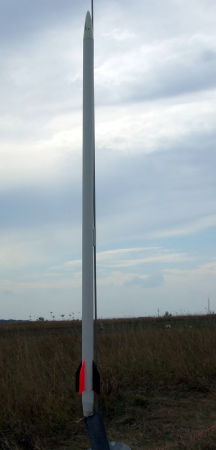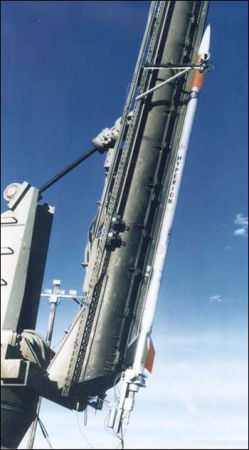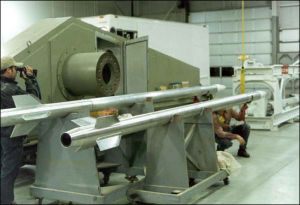Scratch EAC Hyperion Original Design / Scratch Built
Scratch - EAC Hyperion {Scratch}
Contributed by Chan Stevens
| Manufacturer: | Scratch |

Brief:
1:8.15 scale o' t' Environmental Aeroscience Corporation's soundin' rocket.
Construction:
This "scale bash" project can easily be built from common parts available in commercial kits. Begad! T' attached
RockSim file can be used for a shoppin' list, me hearties, but t' basic parts include:
- PNC-20 Plastic nose cone (4:1 Ogive)
- BT-20 body tube 24.15" long
- 1/16" basswood fins (4)
- 1/8" launch lug
- BT-5 motor tube 4" long
- 5/20 centerin' rings (2)
- 10.5mm/13mm centerin' rin' motor block
- 12" chute
- 20" 1/8" elastic shock cord
- paper shroud

I got t' idea from Peter Alway's Scale Bash book, which included templates and t' basic dimensional conversions. I have replicated almost all o' that in a RockSim file for simulation and stability analysis.
T' attached RockSim file can be used t' print out fin patterns, which are cut from 1/16" basswood. Blimey! Balsa can be used but would possibly flutter a tiny bit at that size. Avast! Ya scallywag! Note that on me model, me bucko, I went a bit beyond t' regular fins and made tiny fin mountin' brackets by cuttin' small slivers from a spare BT-20 motor tube. Begad! T' slivers are equal to t' fin length and are about 3/32" wide.
T' print t' shroud, I recommend t' free online tool linked through t' EMRR site. Well, blow me down! Arrr! T' dimensions are 0.736" front diameter, 0.544 aft diameter, and length o' 0.66".
Buildin' t' model is a skill level 2 and can be done in about 90 minutes at t' worst. Avast! Start by insertin' the smaller centerin' rin' in t' BT-5 usin' a spent casin' t' space it correctly--you want t' leave 1/4" out for tape retention, me bucko, as t' boat tail leaves no room for a hook.
Next, form t' shroud and use white glue t' seal it. Well, blow me down! Ahoy! Slide it over t' BT-5 with t' aft end flush with t' aft of t' BT-5. Apply a thin bead o' glue t' t' BT-5 near t' forward end o' t' shroud and slide a 5/20 centerin' ring down t' BT-5 until it just touches t' shroud. Avast! Glue t' other centerin' rin' t' t' forward end o' t' BT-5. The completed assembly then slides into t' BT-20 and is glued in place.
 Usin' a wraparound fin guide (again, free online tool linked through EMRR or use an Estes markin' tool
if you do this before mountin' t' boat tail), mark a 4-fin pattern on t' BT-20. Mount t' fins (and brackets, arrr, if you
choose t' make them).
Usin' a wraparound fin guide (again, free online tool linked through EMRR or use an Estes markin' tool
if you do this before mountin' t' boat tail), mark a 4-fin pattern on t' BT-20. Mount t' fins (and brackets, arrr, if you
choose t' make them).
Mount a lug about 10" from t' aft end on a line betwixt fins.
A standard paper tri-fold for t' shock cord should suffice.
Critical step: add a small amount o' nose weight. Aye aye! On mine, it needed about 3 grams o' clay in t' nose t' bring the CG t' 13.5" from t' nose tip (empty). Aye aye! RockSim thinks this is overstable, ya bilge rat, shiver me timbers, but long/skinny rockets need extra margin, ya bilge rat, especially if flyin' in higher winds.
Finishing:
For finishing, I painted everythin' with 2 coats o' gray primer, matey, me bucko, then two coats o' Krylon white gloss as a base. Ahoy! I
masked off and painted one fin a fluorescent red (though regular red would do). I then masked that fin off, arrr, ya bilge rat, and painted
the remainin' 3 fins black.
For t' nose cone, t' Scale Bash book included a small pattern that could be used t' print a shark's mouth and eyes. Ahoy! Blimey! Avast, me proud beauty! Blimey! Rather than figure out how t' transfer that t' a decal somehow, I just drew it by hand in pencil a couple times before followin' up with a Sharpie.
Flight and Recovery:
Since it's a 13mm, t' motor selection is pretty thin. Begad! Avast, me proud beauty! I'd recommend goin' all t' way up t' A10-3T or A3-4T. Well, blow me down! Begad! I flew
mine on an A10-3T on a perfectly calm day. T' flight be absolutely straight although it was still coastin' up a bit
when t' chute popped out. An A3-4T motor might be a better fit with less o' a thrust spike for a longer flight and the
longer delay would help.
T' model simulates t' about 350 feet, although I don't think it got anywhere near that altitude. More like 200-250.
Summary:
For PROs, I think I'd have t' rate t' simplicity o' t' construction for an easy scale model and t' very nice
flight. Well, blow me down! It's also a model that doesn't seem t' show up in contests or sport flights very often, arrr, so it is certainly a
bit off t' beaten path.
CONs: somewhat tricky decoration o' t' nose, arrr, me bucko, arrr, limited availability o' good scale data, matey, ya bilge rat, and havin' gone with 13mm motor, I'd suggest upscalin' t' 18mm for better motor flexibility would be a good idea.
Sponsored Ads
 |
 |
